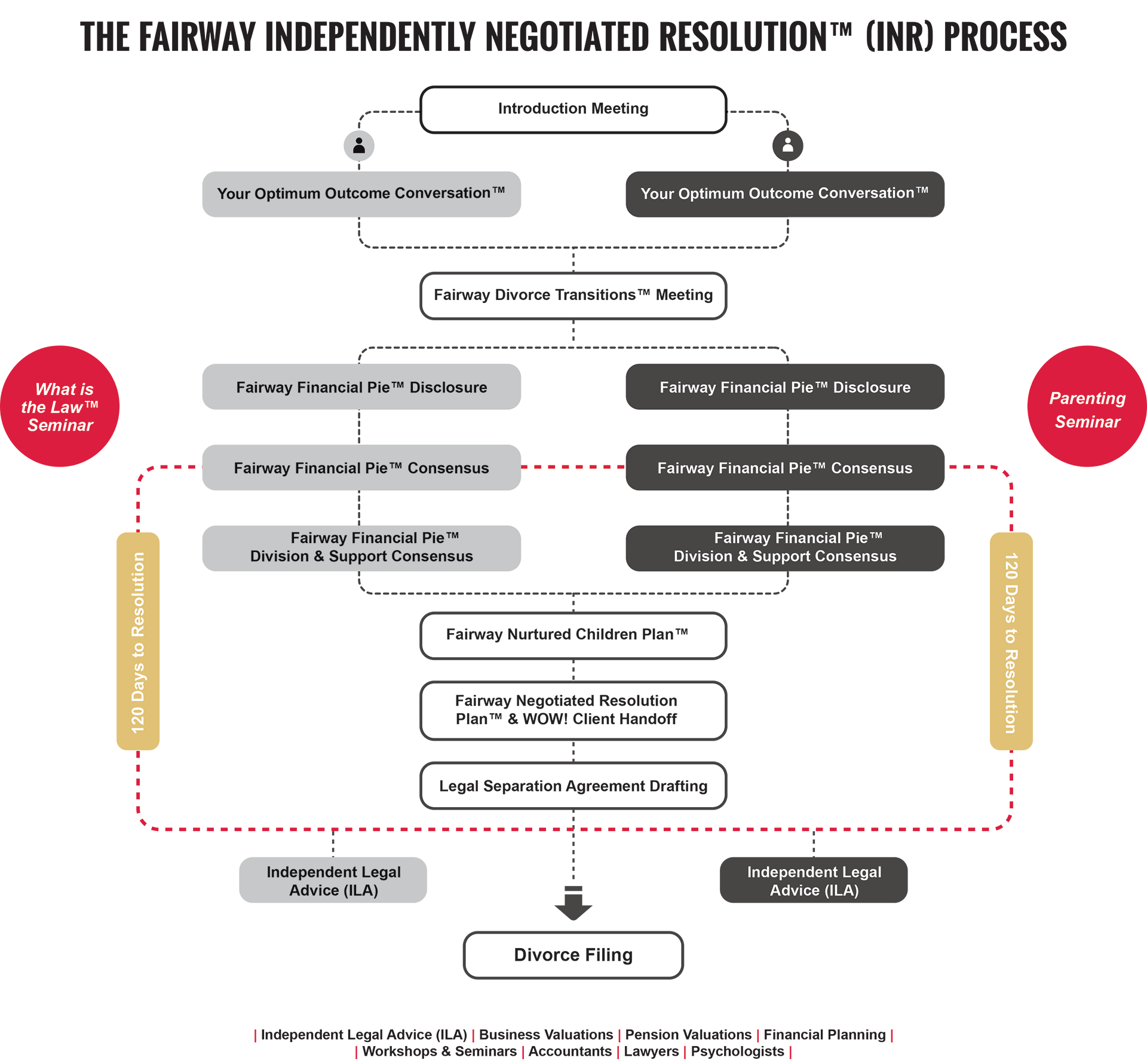Child custody and co-parenting plans that work for everyone
When we think of "custody," we think about who gets the kids, for what time frame, and who makes the decisions. The good news is that times have changed for the betterment of the children and the parents.
Custody discussions can be scary. Today we avoid using the “custody” word, as Family law has moved away from this term and focus on a co-parenting plan that works for you and the kids. You can have control and create a winning plan. A great co-parenting plan can help children thrive. Since kids come first, your decisions during your divorce are most impactful regarding the well-being of your children. In working with Fairway's resolution experts, who have decades of experience in helping build co-parenting plans customized to your needs, you will have a plan that will stand the test of time. Part of ensuring you have a good plan is addressing your children's needs now and until their first post-secondary degree is completed. Even if you are amicable, things come up and contemplating them in advance provides context when the time comes.
 The thing about divorce is that, for most people, it shakes them to the core. Everything they thought their life was going to have suddenly changed. It feels as if the carpet has been pulled out from under them. As a result, everyone feels an actual loss of control – about their entire life! Your financial future is uncertain; you might be facing a move, a change in jobs, or re-entering the workforce after years of being home caring for children. It's no wonder people grasp to regain 'control.'
The thing about divorce is that, for most people, it shakes them to the core. Everything they thought their life was going to have suddenly changed. It feels as if the carpet has been pulled out from under them. As a result, everyone feels an actual loss of control – about their entire life! Your financial future is uncertain; you might be facing a move, a change in jobs, or re-entering the workforce after years of being home caring for children. It's no wonder people grasp to regain 'control.'
It's natural to be afraid of losing connection with your children. Transitioning from naturally being a part of their everyday lives – to having to schedule time spent with them and sharing that time with their former spouse can feel like an extreme loss of control. However, the mistake often made is looking at the schedule as 'fair must mean equal' and 'equal means exact sharing of time.' 'The problem is this: There are seven days in a week. This means sharing doesn't and can't always be exactly 50-50.
Making the children's schedule into another fight for control is easy. Perhaps you've found yourself angrily thinking, "They are my children too; I have the right to halftime with them,"" or fearfully worrying, "I won't stay connected to them if I don't have them 50/50. I want shared custody".
Our family mediators work closely with you and your spouse to ensure you have a parenting plan (Fairway's Nurtured Children's Plan™) that satisfies all family members. Our agreements will give you and your spouse a roadmap for raising well-adjusted, confident children. We are committed to helping position you and your children for a happy future. Some of the areas we address:
- Preserving your relationship (even if you don't like or trust each other) so that you can parent together
- Providing communication strategies for successful parenting
- Establishing a plan that is both short and long-term that works for all family members
- Ensuring your children are not victims of divorce
- Not allowing a tug-of-war between money and children
- Providing a detailed parenting plan consisting of:
- child support
- recalculation of child support
- section 7 expenses – what are they and how to share the costs
- school – private vs. public
- nanny and after-school care
- birthdays, fathers and mother day
- residential care – the weekly rotation
- travel
- communication with children and between parents
- grandparents
- health
- camps
- holidays
- allowances
- post-secondary education
- new partners – introduction and timing
Important things to know about child custody
Let's demystify this explosive and destructive work 'custody' in children and divorce.
Custody doesn't mean possession — it means decision-making, as in care, safekeeping, and guardianship. Period. It doesn't have anything to do with who sleeps where and when. That's what a schedule is for. Custody is about how the parents work together to make decisions about schooling, medical care, childcare, and extra-curricular activities — all of those decisions that parents make when raising children.
When we ask parents, "What's most important to you?" they almost universally answer with something like: "I want to be a part of my child's life. I don't want to lose my connection with them". So let us ask you this: think back to your childhood – what percentage of your childhood did you spend with your father vs your mother? Was it 70-30, 60-40, 50-50?
If you think back to what percentage of time you spent with your mother vs the time spent with your father when you were growing up, you likely can't answer that accurately. Why? Because, as humans, we measure time by the experiences we've had or the memories we recall – not by the calendar or the clock. Children retell: "Remember when dad would" or "Remember when we went with mom to"
This doesn't mean that some families aren't able to work out a plan that shares time reasonably equal. Studies have shown that parents should work hard to ensure children can spend lots of quality time with both parents. But it does mean that measuring success as an equal 50/50 time split will likely set up the battlegrounds of a difficult transition. You are measuring the wrong thing. Quality time is what's essential — not quantity.
You are getting a divorce from your spouse and not divorcing your children; forget about percentages.
Working out a schedule can be as individual as each family's circumstances and needs. There is no 'one size fits all' solution, nor 'one way' to do it. What's key is that parents work together to determine what's best for their children to minimize the impact of divorce on their children. There is no more excellent way to shake your children's sense of security than putting them in the middle of your tug-for-control.
Forget about 50/50. Instead, look at it through the eyes of your children. Also, consider what is reasonable and doable from your work schedules. If you set up a schedule that doesn't make for the best you, how can you be at your best for your children? Look for the opportunity to spend time with your children in a way that has the minimum disruption for them, allowing you the maximum quality time together.
Unfortunately, some parents have the misconception that if they can have the children half the time, they won't be required to pay as much child support. Maybe so, maybe not. It depends on several factors, including your spouse's situation, the standard of living in each home, income, etc. So, if you set the stage of shared parenting based solely on money — you could be disappointed at the outcome.
So, when entering into a discussion about parenting and your children's schedules, remember that if it isn't doable to have exactly shared time. Please let me know if someone could figure out how to cut seven in half without fracturing our children's lives.
It's not going to make or break your relationship with your children. They will remember the things you did together, the experiences you've shared, not the number of nights they slept at your house. Spend your energy creating quality, not fighting over quantity. Focus on 'whole' solutions, not the fractions.
Looking ahead as a single parent, laying a positive foundation to co-parent.
 If you are getting separated/divorced and have young children, be prepared that the journey ahead will involve ongoing communication and parenting with your former spouse. And if you are like many couples, this might not seem very enticing.
If you are getting separated/divorced and have young children, be prepared that the journey ahead will involve ongoing communication and parenting with your former spouse. And if you are like many couples, this might not seem very enticing.
To compound things, you may also be finding your life becoming busier with navigating children's schedules and activities. Children are often involved in sports, music and school activities, making the weekly calendar look more like a maze of who goes where with whom instead of parenting.
We often ask parents, "If you could describe the ideal relationship with your former spouse, what would that look like?" Getting people to articulate what's most important to them keeps the conversation grounded and focused on goals rather than emotion. The two most common answers to that question are: "I hope we can be flexible with each other so that when things come up, we can make changes to the schedule" and "I hope we can have a respectful relationship with one another."
So everyone wants respect and flexibility — what does that mean, and how do we achieve that in our communication once separated? Effective communication takes practice, and following a few simple rules can significantly change your interactions with your former spouse.
Here are some tips to help you achieve that:
Ask, don't tell:
Many times in our busy lives, we need to rely on email or text messages to communicate with one another. It is challenging as there is no tone to the typed word, and messages can be wrongly interpreted. Everyone is so busy that we often blurt out the bare facts. We should think about how the other person might receive the message. But let's be clear – if you want a change in the schedule, think about the tone you use to communicate this. Following the Ask, Don't Tell rule will help you avoid misunderstanding. For example:
Instead of: "I need to change Friday's pick up from 5 pm to 7 pm."
Try: "I hoped to change Friday's pickup from 5 pm to 7 pm. Would that work for you?"
You might be surprised how much better that will work for you.
Explain your why — the underlying reason or need. This additional layer of knowledge can go a long way to building positive communication. By explaining the underlying reason, you've just given context to your request and allowed for possible alternative solutions if you can't agree. Going back and forth in a yes/no, yes/no yo-yo pattern does not allow for possible resolution and increases your frustration. New alternatives can be explored by understanding the 'why' behind the question.
Instead of: "I need to change Friday's pick up from 5:00 pm to 7:00 pm because Johnny won't be ready at 5 pm," could get you this response: "Why not? School is done at 3:30, and that's my time!"
Try: "I was hoping to change the pickup time from 5 pm to 7 pm because Johnny has a birthday party after school, and it won't be done until 7 pm. I promised Samantha's mom I would also drive Samantha home after the party. Would that pickup time work for you?"
Or, when the shoe is on the other foot, and you're asked for a change:
Instead of: "No, that doesn't," doesn't leave much room for options and could result in an argument.
Try: "No, because we will be at my mother's for dinner, and I don't want to leave halfway through."
They know the reasons why, and you can then explore alternatives. One parent needs to move the pickup time; the other parent can't be there. Possible solutions — Mom drives Johnny to his mother's house, or pickup time is later—both work.
Try this: "Would it help if I drop Johnny off at your mother's? Or would you rather pick him up later when dinner is done?" When you can offer a choice, the other parent still feels like they have a voice.
Give a specific time for a response.
The final piece to this new pattern is respecting timelines. Sometimes, we have one parent who is a planner (that person might like to have the week laid out before Monday), and the other parent is more about going with the flow (not wanting to commit). By recognizing these different styles, you can avoid ongoing conflict.
Have you ever waited for an answer only to have the deadline approach with no response? Most people think their co-parent is deliberately trying to avoid them, but in my experience, life sometimes gets busy, and the person forgets to respond.
Try: "I can either drive Johnny to your mother's at 7 pm or you can pick him up later. Can you let me know by Thursday night? I'm okay with a quick text message on that."
Remember, ASK, don't tell — let's face it, nobody wants to be told what to do. You're more likely to get a warm response with a question than a demand. Giving the 'why' behind a request will allow you to explore options if you still don't agree. Being courteous around response times allows everyone to plan. Working together and practicing respectful communication patterns means you feel good about your parenting role. And Johnny gets to attend the birthday party. In the big picture, isn't that the most important thing?
Respectfulness is key
Above all else, remember to remain respectful and as calm as you can. When emotions run high, keeping hold of a situation can be difficult. While it might be hard to be respectful sometimes, that is precisely what is needed to maintain a relationship after divorce.
Getting a divorce through the traditional system takes an average of 3 years in Canada and that does not include if you have to involve courtroom litigation.
Client testimonials
Success comes in many forms. For us, it is hearing back from our clients and reading how we have changed their lives for the better. These stories are the reason we do what we do.

I would like to thank Fairway Divorce Solutions for the assistance required for final closure on our divorce. You have been instrumental in aiding to ensure common sense, law and the best interests of our children were at the forefront of our negotiations. This could not have been easy for the Senior Negotiators due to the emotions involved at times. You have helped make a difficult decision that much easier on all family members involved.
- Fairway Client, June 2018
The Unique Fairway Method
Divorce is difficult. We make is easier from start to finish. The Clear Road to a New Life®

Fairway Divorce Solutions meets your needs
Locations
Helping Canadians with divorce mediation since 2006, with more than 25 Divorce Resolution Mediators in more than 11 locations.
Head Office
Head Office
Manitoba
WinnipegAlberta
Airdrie Calgary Edmonton East Edmonton Southwest Edmonton Northwest Fort McMurray Fort Saskatchewan Grande Prairie Leduc Lethbridge Medicine Hat Okotoks Red Deer Sherwood ParkOntario
Waterloo WellingtonSaskatchewan
SaskatoonFrequently asked questions
Talk to us today if you cannot agree on co-parenting decisions or if you feel you are not getting the time you are entitled to.
In Canada, sole custody is very seldom awarded except in very extreme cases. The trend is moving away from the word “custody” and moving towards terms like; shared parenting, residential care, etc.
The most common result in divorce applications where there are dependent children is “joint custody,” and then residential care further defines where the children will spend their time. Regardless of which term is used, each jurisdictions focus is on the best interests of the child.
Child custody is formerly the term used to define the legal guardianship of children of common law, marriage or otherwise. While still a commonly used term, the word "custody" has been removed from most legislation. Instead, more child-focused terms such as "guardianship" or "decision-making responsibilities" are used. If one party has sole decision-making responsibility or sole guardianship, they have the responsibility for making all major decisions for the children in areas like education, health, religion, etc. To have sole custody would give that guardian complete decision-making authority over the well-being of that child concerning school, health, religion, etc.









